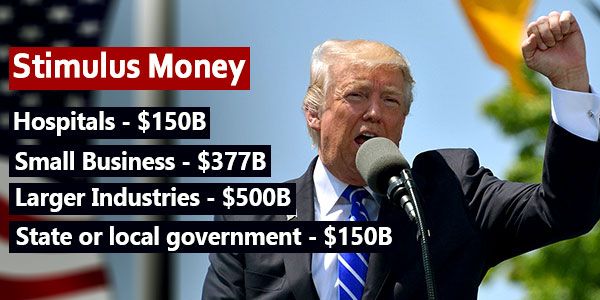The COVID-19 pandemic has given a huge blow to the economic condition across the world. Many people are fearing job losses or pay cuts as they are unable to step out of their houses!
And let me tell you, this fear is quite justified. The reason being, some of the people have already lost their jobs or got a pay cut!
Amidst all these, the people of our country got a sigh of relief when President Trump signed the Coronavirus Aid, Relief, and Economic Security (CARES) Act on March 27, 2020. It will provide a $2 trillion stimulus for most of the people in our country who are financially affected due to COVID-19. The US government is gonna send checks or direct deposits to help those people financially. It’s said that the CARES Act is the largest emergency relief bill in the history of our country.
So, if you are unemployed, or partially unemployed, or can’t go to work for coronavirus-related reasons, you can get this financial help!
But, let me tell you, these stimulus checks are not for everyone! About 83% of the tax filers in our country are likely gonna get stimulus checks. So, check here whether or not you are eligible for getting the stimulus check!
Let’s start!
- You need to have a valid Social Security Number (SSN)
- For individual taxpayers
SIf your adjusted gross income (AGI) is up to $75,000 in the last year, you can get a full amount check of $1,200. Otherwise, if your AGI is up to $99,000 a year, you will get reduced checks.
- For married couples filing jointly
If you are married and file your taxes jointly and have an AGI below $150,000 a year, you can get a check of $2,400.
And if the AGI of you and your spouse is up to $198,000 and file your taxes jointly, then you will receive checks with reduced amounts. However, married couples who have children below the age of 17 can get an extra $500 for every child.
- For the head of households
If you file as a head of household and your annual AGI is up to $112,500, you are eligible for a $1,200 check. But you will get a reduced check if your annual AGI is up to $136,500. Being the head of the household, you can get an extra $500 per child below the age of 17.
In all the above cases, your adjusted gross income will be calculated based on your 2019 tax returns. In case you haven't filed your tax return yet, your AGI based on your 2018 tax returns will be considered.
Besides, the IRS (Internal Revenue Service) will check whether or not you meet the qualifications to receive the stimulus check.
Now, you might be thinking, how will the government know where to send the money?
Well, while checking your latest tax returns, the IRS will find your bank details. And it will use the direct deposit information to send the money to your bank account. However, if you have closed your account or your direct deposit details aren’t provided, the IRS will mail you a check.
And if you don’t file taxes but receive Social Security benefits, the IRS will use that information to send you the money. But what if neither you file taxes nor you receive Social Security benefits?
In that case, the IRS has announced that they will come up with an online portal where you can submit your information.
But the question still remains, when can you expect to receive the check?
Well, this is not clear yet! According to the Treasury Secretary Steven Mnuchin, the government is likely gonna start rolling out the payments from April 17, 2020. And it will start with the payments of the direct deposits first! For recent updates, you can follow the Coronavirus Tax Relief page of the IRS.
The US government made such payments last in 2008. During that time, it took almost 8 weeks for everyone to receive stimulus checks.
So, based on that, you can make anticipation of how much time it will take to get stimulus checks.
However, when you get the check, make good use of it! For example, you can use the stimulus check to pay off your outstanding bills or stash that money to your emergency fund.
But if you are already debt-trapped, I would suggest you not to wait for your stimulus check. We are already going through a tough time due to the pandemic and these debts can be added burdens. So, you can find some ways to get debt relief amidst COVID-19 pandemic and remain stress-free about your debts!
Lastly, stay safe during this pandemic! Stay home and don’t panic. This too shall pass!









